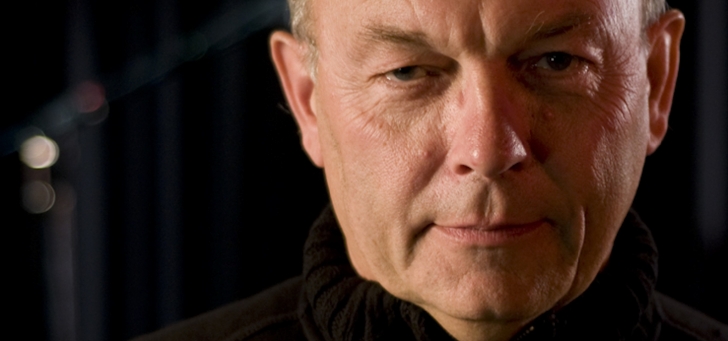William D. MacGillivray – An Iconoclastic Visionary
William MacGillivray‘s upcoming 70th birthday in May has me thinking about the life and career of one of Atlantic Canada’s most important filmmakers, a man to whom the word “iconoclast” definitely applies.
Born in St. John’s, Newfoundland in 1946, just before Confederation with Canada, MacGillivray journeyed to Halifax to study at the Nova Scotia College of Art and Design. He went on to Concordia in Montreal and then to the London Film School, the one now associated with the great realist filmmaker Mike Leigh.
I know MacGillivray in a number of different ways. He was the art teacher at my high school, and true to his generous nature he allowed himself to be convinced to play at one of our student-run coffeehouses. Delivering a fine electric set with another teacher (English teacher David Hopewell) along with a student rhythm section, MacGillivray churned through an eclectic clutch of songs including Van Morrison’s “You Gotta Make It The World” from the Irishman’s then current 1977 album A Period Of Transition.
Shortly thereafter Bill (as he requested everyone to address him, even his students, rather than ‘Mr. MacGillivray’) shot part of his first major film, Aerial View, at Halifax West. The film looked at the contemporary realities of East Coast living, covering issues of identity, politics and fulfillment, all of which would be recurring themes in Bill’s career as he moved forward.
Aerial View established many elements of Bill’s style. It was occasionally opaque, poetic, fluid and questioning; seeing the film brought both the shock of recognition at seeing ourselves up on the screen along with the brisk fact that the filmmaker was offering engagement rather than escapism.
Throughout his major works, including the earlier pieces Life Classes, The Vacant Lot, and I Will Not Make Any More Boring Art, right up to later features such as The Man Of A Thousand Songs, Danny and Hard Drive, the Newfoundland-born, Nova Scotia-based filmmaker maintained a level of artistic integrity unrivaled in the region.

Bill’s curiousity and humanism runs throughout all of his work, matched by a questing adventurousness when it comes to form and approach. As late as 2012 he was challenging typical non-fiction formats with his CBC documentary The Panther Next Door, which balanced talking-head history and site explorations with a confrontational council format that resisted the easy nostalgia the East Coast for which the East Coast is often known.
I chanced across Bill again when working for the National Film Board’s Atlantic Office in the early 1990s. Reading scripts for the agency’s once-a-year collaborative feature film program, I recommended his real-time video experiment Understanding Bliss; many on the NFB staff were perplexed by the script’s formal qualities and unflinching examination of Canadian Cultural biases, but I pushed for them to take a leap of faith.
Understanding Bliss might have been the first Canadian Feature to ever mention the terms ‘Cultural Studies’; what I remember from the film, however, are the extraordinary lyrical moments. One sequence featured a young Rick Mercer, in what must have been his first major screen role, in a long follow shot that traversed the steep St. John’s streets and walkways, anchoring the film in a profound sense of place.
Over the next two years I was lucky enough to be the NFB marketing officer responsible for the roll-out and packaging of Bill’s feature-length portrait of the state of the Canadian Family, entitled For Generations To Come. A national tour resulted in the honour of the United Nations’ International Year of the Family with the film and the filmmaker going coast-to-coast across the country.
William D. MacGillivray is still a busy and visionary writer, producer and director. He has also written what I consider to be the single greatest un-produced feature film script ever penned in Atlantic Canada, The Dreams Of Jinky Drover. An extraordinary story of a great East Coast character who loses a voice while in exile in Portugal, it’s a tale that begs to be filmed.
Now a recipient of multiple awards and retrospectives, Bill has little to prove to anyone. Being the subject of doctorates and representing Canada abroad at prestigious film festivals like Berlin, heis a motion picture artist who could easily just rest on his laurels.
Instead, however, he’s continually upending expectations, as in the extraordinary The Panther Next Door and the moving Hard Drive, all the while still intent on locating the soul of the East Coast. And while that might always be something of a moving target, so is Bill himself – always shifting, always changing, always re-adjusting his vision.
It’s a vision that has brought the Atlantic Cinema into a very sharp focus indeed.
Ron Foley Macdonald
Latest posts by Ron Foley Macdonald (see all)
- Mary Tyler Moore in Nova Scotia - January 30, 2017
- Viola Desmond’s Story on Film - December 11, 2016
- Bruce Springsteen’s “Born to Run” - December 9, 2016

